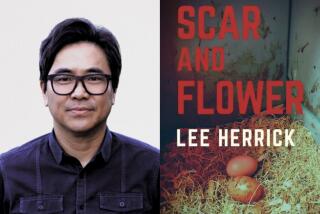Poet Bukowski feted 20 years after his death — at dive bar, of course
- Share via
Charles Bukowski was known for his drinking as much as his poetry.
So maybe, the man Time magazine once described as “the laureate of lowlife,” would have approved of a 20th-anniversary memorial held in his honor at the dimly lighted King Eddy Saloon on the edge of skid row.
The dive bar, said to be a favorite haunt of the poet and his own idol, novelist John Fante, was filled with Bukowski fans Sunday, spilling out onto the street in a night of poetry, toasts and vulgarity.
“How many writers and artists weren’t alcoholics or drug addicts or sex fiends?” said poet and actor S.A. Griffin, who read a selection of the author’s work for the crowd.
“He makes something very ordinary or very ugly, very beautiful.”
Bukowski, who died March 9, 1994, at 73, helped drag Los Angeles onto the literary map, and his literary papers — boozy poetry, manuscripts and his screenplay for “Barfly” — are housed at the Huntington Library in San Marino, not far from a more stately collection of Shakespeare’s work.
The poet had a tenacious, bullheaded approach to life, but somehow it worked and his writing proved that, said Richard Schave, founder of the Los Angeles Visionaries Assn., which staged the event.
Patrons stood shoulder to shoulder around the bar, crowding the walkways and lining the walls to hear snippets of poetry about the raw and elemental L.A. that Bukowski wrote about — the drunks, the prostitutes and the tragedy that came with it all.
Fans swapped stories of chance meetings with Bukowski or the visceral, deep reaction the first time they read his work.
He resurrected Fante’s “Ask the Dust,” a Depression-era novel about life in Los Angeles, recalled Dan Fante, the author’s son, before reading a selection of poems inspired by Bukowski and written for his father.
A few months back, a woman told saxophone player Reginald Scott to read Bukowski. You sound like him, you’d like him, she told him. Scott said he picked up a book and was hooked on the feelings and the way the author lived his life.
The words, Scott said, feel like his music, things he tries to evoke in people when he plays.
Bars, the racetrack, the gridlocked traffic and of course the alcohol — banal things came alive in Bukowski’s writing, said Vincent Destefano of Pasadena, who attended with his wife, Karen.
“It’s a perfect picture of L.A. then, now and tomorrow,” Destefano said. “When I think about Bukowski and John Fante, I think about my home.”
Bukowski wrote about the “wild side of life,” unpolished or mundane as it could be, and encouraged others to do the same, said poet Joan Jobe Smith, who found a mentor in Bukowski after he urged her to write about her years working as a go-go dancer.
“He had to write to survive. His childhood was brutal, it was a nightmare. You read about his early days and you don’t know how he even survived,” said poet Suzanne Lummis, who read at the event.
“He didn’t worry about which poem was golden, it was left for everyone else to figure out which were the stunning ones.”
JR Phillips recalled sitting with the author at the racetrack after spotting him in the corner alone one afternoon. They started making bets, then drinking, then talking about women and other things, but never poetry, said Phillips.
“I didn’t tell him I was into poetry,” Phillips recalled. “I didn’t want him to associate me as a groupie.”
More to Read
Sign up for Essential California
The most important California stories and recommendations in your inbox every morning.
You may occasionally receive promotional content from the Los Angeles Times.











